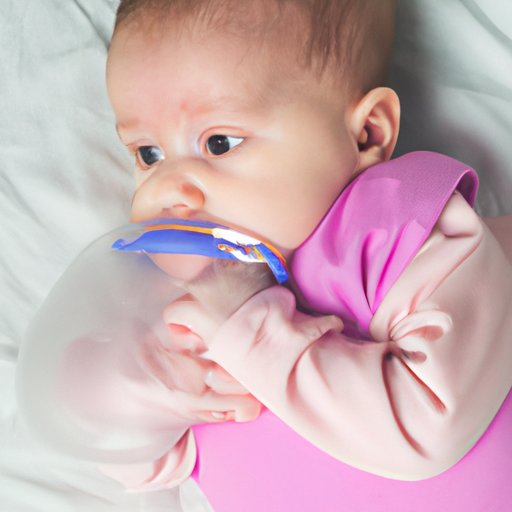I. Introduction
As a new parent, the sight of your baby spitting up can be alarming and cause unnecessary worry. You may be wondering if this is normal or if there is something more concerning at play. Infant spit-up is a common occurrence in babies, but it is important to understand the causes to know when to seek medical advice. In this article, we will explore common causes of infant spit-up, how to prevent it, and when to seek medical attention for your baby.
II. Exploring Common Causes of Infant Spit-Up
There are several common causes of infant spit-up, including:
Overfeeding-why it happens and how it can be prevented
It is easy to overfeed a baby, especially if they are bottle-fed. Overfeeding can lead to discomfort, spitting up, and even vomiting. To prevent overfeeding, ensure that you are feeding your baby the recommended amount for their age and weight. Pay attention to your baby’s feeding cues, and make sure to burp them regularly throughout the feeding.
Reflux and GERD
Reflux occurs when the muscle at the end of the baby’s esophagus is not yet fully developed, allowing milk or food to flow back up into the mouth. GERD is a more severe form of reflux, in which the baby experiences discomfort, spitting up, and even pain. If you suspect that your baby has reflux or GERD, it is important to consult with your pediatrician for treatment.
Food allergies and intolerances
Food allergies or intolerances can cause a range of symptoms, including spitting up. It is important to identify any potential food allergies or intolerances by keeping a food diary and monitoring your baby’s reaction to different types of food. Consult with your pediatrician if you suspect that your baby may have a food allergy or intolerance.
III. Understanding Your Baby’s Digestive System
To understand why babies spit up, it is important to understand how their digestive system works. Babies have a less developed digestive system than adults, which means that it takes longer for their food to move through their system. Additionally, the flap of muscle that separates the baby’s esophagus from the stomach is not fully developed, which can allow food and milk to flow back up into the mouth.
Other factors that can impact digestion include how the baby is being fed (breastfeeding versus formula), the baby’s age, and hormonal changes in the baby’s body. These factors can contribute to spit-up and discomfort for the baby.
IV. Is Your Feeding Technique to Blame for Your Baby’s Spit-Up?
Adjusting your feeding technique can often help to prevent infant spit-up. Here are some ways to adjust your feeding technique:
A step by step guideline for the parent on how to adjust their feeding technique
When bottle-feeding, make sure the nipple is the appropriate size for your baby. If the nipple is too large, your baby may be taking in too much air, which can cause discomfort and spit-up. When breastfeeding, make sure that your baby is latching properly to prevent excessive air intake.
Feeding smaller, more frequent meals
Feeding your baby smaller, more frequent meals can help prevent overfeeding and reduce the risk of spit-up. Try feeding your baby every 2-3 hours, or on demand if they are breastfeeding.
Keeping babies upright for a period after feeding
Keeping your baby upright for a period after feeding can help prevent spit-up. Try holding your baby upright for 20-30 minutes after a feeding, or use a baby swing or carrier to keep them upright.
V. When to Call a Doctor:
In some cases, infant spit-up can be a sign of a more severe condition that requires medical attention. Here are some signs to look for:
How to tell if baby spit-up is normal or if a medical attention is needed
If your baby is consistently spitting up more than usual or appears uncomfortable after a feeding, consult with your pediatrician. Additionally, if your baby is not gaining weight or is experiencing breathing difficulties, seek medical attention immediately.
Signs that your baby’s spit-up could be a sign of gastroesophageal reflux disease (GERD)
If your baby is experiencing consistent discomfort, vomiting, or is not gaining weight, it may be a sign of GERD. Your pediatrician may recommend medications or other treatments to alleviate your baby’s symptoms.
VI. Food Allergies in Your Baby’s Spit-Up
Food allergies can cause a range of symptoms, including spitting up, diarrhea, vomiting, and rash. It is important to identify any potential food allergies or intolerances in your baby by keeping a food diary and consulting with your pediatrician. If a food allergy is suspected, your pediatrician may recommend an elimination diet or allergy testing.
What are food allergies
Food allergies occur when the body’s immune system overreacts to a specific food, causing a range of symptoms.
How to identify and address them
To identify potential food allergies, keep a food diary and monitor your baby’s reaction to different types of food. Consult with your pediatrician to determine if additional testing or an elimination diet is necessary.
Relevance of food allergies in spit-up formulation
Food allergies can contribute to infant spit-up and discomfort. Identifying and addressing potential food allergies can help alleviate your baby’s symptoms and prevent future issues.
VII. What’s “Normal” When It Comes to Baby Spit-Up?
It is important to recognize that infant spit-up is normal and a part of a baby’s development. However, excess spit-up or discomfort can be a sign of a more severe issue. Differentiating between normal spit-up and harmful spit-up is important for parents to prevent unnecessary worry. Consult with your pediatrician if you are concerned about your baby’s spitting up.
VIII. Conclusion
Understanding the common causes of infant spit-up is crucial to preventing unnecessary worry and ensuring your baby’s health. Adjusting feeding techniques and identifying potential food allergies are just a few ways to alleviate your baby’s discomfort. Remember to consult with your pediatrician if you are concerned about your baby’s spit-up or discomfort.
